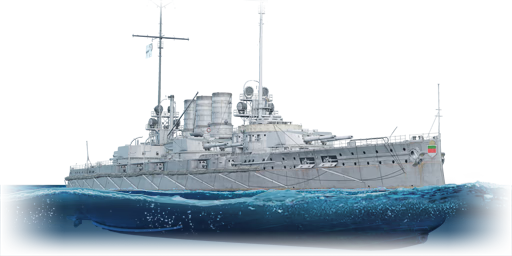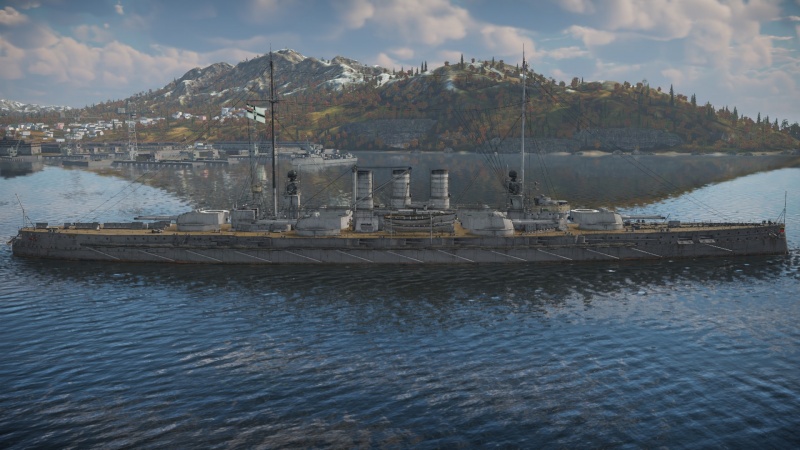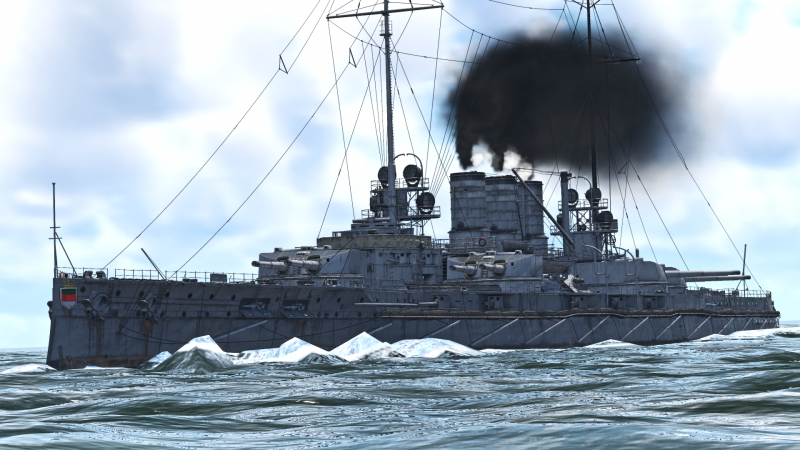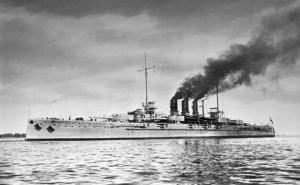SMS Helgoland
Contents
Description
The Helgoland-class, SMS Helgoland, 1911 was the lead ship of the Helgoland-class battleships built for Kaiserliche Marine in the early 1910s. Helgoland was laid down on 11th November 1908 and commissioned on 23rd August 1911. Helgoland was intended to replace old coastal defence ship Siegfried in service and complement the older 283 mm armed Nassau-class. Helgoland took part in actions against the Royal Navy during WWI, where it participated in shelling of the British coast as well as the Battle of the Gulf of Riga in August 1915. Helgoland was also present during the Battle of Jutland where she was lightly damaged by Barham or Valiant; a 15-inch shell hit and penetrated the main armoured belt which required her to enter dry dock. During the battle, Helgoland sank destroyer HMS Fortune with her 15 cm secondary battery. In November 1918, the ship's crew took part in the Wilhelmshaven mutiny. After the armistice, Helgoland was handed over to the Allies as reparation for the ships sunk at Scapa Flow. She was handed over to Britain formally on 5th August 1920 and was scrapped at Morecambe on 3rd March 1921.
Introduced in Update "New Power", Helgoland features 305 mm main armament as opposed to the previous Nassau-class's 283 mm guns, offering heavier firepower. However, due to the turret placement, Helgoland is only able to fire four out of six turrets when utilizing full broadside. Helgoland also has shell rooms placed along the waterline, making hits penetrating the main belt devastating to the ship. The rooms are protected by additional armour in the form of coal bunkers, offering temporary additional protection. The disadvantage of Helgoland also lies in tightly packed machinery, where all the engines are in a single section next to each other. If shells hit this area, they will completely immobilize the ship.
General info
Survivability and armour
This Helgoland-class dreadnought comes with a thick side armoured belt of 300 mm, and other places being 90 to 170 mm thick. This can stop 356 mm HE rounds except at the higher sections of the bow and stern.
All 6 turrets have thick barbettes, which AP shells have to go through after the already thick side armour.
Ammunition is surrounded by coal bunkers, in addition to a turtle-back armour scheme.
In short: she is one of the toughest battleships in the game, as long as she faces fair opponents.
To survive longer, do not repair secondary battery. Doing so will remove crew from your armoured hull and put it in the vulnerable secondary turrets, for them to be killed again.
Mobility
| Mobility Characteristics | |||
|---|---|---|---|
| Game Mode | Upgrade Status | Maximum Speed (km/h) | |
| Forward | Reverse | ||
| AB | |||
| Upgraded | |||
| RB/SB | |||
| Upgraded | |||
Being a dreadnought, it was all about armour and firepower. She will reach a little bit over 38 km/h maxed out.
Modifications and economy
Armament
Primary armament
Her primary armament is somewhat lacking for her size. She has 6 turrets, but only 4 can fire at a broadside. 3 can fire most of the time and worst case scenario only 2 will fire.
Her turrets have each double 305 mm guns, this is somewhat lacking for long range fights.
| Penetration statistics | |||||||
|---|---|---|---|---|---|---|---|
| Ammunition | Type of warhead |
Penetration @ 0° Angle of Attack (mm) | |||||
| 1,000 m | 2,500 m | 5,000 m | 7,500 m | 10,000 m | 15,000 m | ||
| Spgr. L/3.8 Bdz | HE | 167 | 149 | 124 | 103 | 87 | 66 |
| Spgr. L/3.3 SAP | SAP | 481 | 430 | 357 | 299 | 252 | 193 |
| Psgr. L/3.4 | APC | 519 | 463 | 383 | 320 | 270 | 205 |
| Shell details | ||||||||||||
|---|---|---|---|---|---|---|---|---|---|---|---|---|
| Ammunition | Type of warhead |
Velocity (m/s) |
Projectile mass (kg) |
Fuse delay (s) |
Fuse sensitivity (mm) |
Explosive mass (TNT equivalent) (kg) |
Ricochet | |||||
| 0% | 50% | 100% | ||||||||||
| Spgr. L/3.8 Bdz | HE | 855 | 405.9 | 0.025 | 17 | 27 | 79° | 80° | 81° | |||
| Spgr. L/3.3 SAP | SAP | 850 | 410 | 0.025 | 17 | 10.8 | 47° | 60° | 65° | |||
| Psgr. L/3.4 | APC | 855 | 405.5 | 0.025 | 17 | 13.6 | 48° | 63° | 71° | |||
Secondary armament
While her primary armament is lacking, she makes it up with great secondaries.
She has fourteen 150 mm guns in casemates all around the ship, and fourteen 88 mm guns with fragmentation shells. Torpedo boats will not like getting close to you.
Even her 150 mm are a real threat to any destroyers, even light cruisers.
| Penetration statistics | |||||||
|---|---|---|---|---|---|---|---|
| Ammunition | Type of warhead |
Penetration @ 0° Angle of Attack (mm) | |||||
| 1,000 m | 2,500 m | 5,000 m | 7,500 m | 10,000 m | 15,000 m | ||
| Sprgr. L/4.1 Kz | HE | 21 | 21 | 21 | 21 | 21 | 21 |
| Sprgr. L/4.1 Bdz | SAPBC | 95 | 80 | 61 | 47 | 37 | 28 |
| Psgr. L/3.7 | APCBC | 238 | 201 | 153 | 117 | 93 | 71 |
| Shell details | ||||||||||||
|---|---|---|---|---|---|---|---|---|---|---|---|---|
| Ammunition | Type of warhead |
Velocity (m/s) |
Projectile mass (kg) |
Fuse delay (s) |
Fuse sensitivity (mm) |
Explosive mass (TNT equivalent) (g) |
Ricochet | |||||
| 0% | 50% | 100% | ||||||||||
| Sprgr. L/4.1 Kz | HE | 835 | 45.3 | 0 | 0.1 | 1,600 | 79° | 80° | 81° | |||
| Sprgr. L/4.1 Bdz | SAPBC | 835 | 45.3 | 0.01 | 7 | 1,050 | 48° | 63° | 71° | |||
| Psgr. L/3.7 | APCBC | 835 | 45.3 | 0.015 | 7 | 990 | 48° | 63° | 71° | |||
Additional armament
She comes with fixed underwater torpedo tubes. Being an old ship, her torpedoes are not remotely good.
She carries a total of sixteen torpedoes, in several launchers: 1 forward, 1 rear, 2+2 per broadside.
Her torpedoes carry only 160 kg of TNT, which may not be enough to break through the torpedo bulges of other dreadnoughts and heavy cruisers. This means that several hits are needed.
Usage in battles
Describe the technique of using this ship, the characteristics of her use in a team and tips on strategy. Abstain from writing an entire guide – don't try to provide a single point of view, but give the reader food for thought. Talk about the most dangerous opponents for this vehicle and provide recommendations on fighting them. If necessary, note the specifics of playing with this vehicle in various modes (AB, RB, SB).
Pros and cons
Pros:
- Massive firepower, primary and secondary
- Heavily armoured, making it hard to sink
Cons:
- Has no anti-air defences
- Is very slow
- 305 mm may have difficulties destroying other dreadnoughts from afar
History
SMS Helgoland was the lead ship of the Helgoland-class of pre-WWI dreadnought battleships. Being an incremental improvement upon the preceding Nassau-class battleships, they featured a more powerful 12-inch (305 mm) battery and improved propulsion system. Built in 1909, she saw service in World War 1; she served in the raid on Scarborough, Battle of Riga, and Battle of Jutland. After the war, Helgoland was handed to the United Kingdom as a war reparation; she was scrapped in 1924.[1][2]
Design and construction
The Helgoland-class was of overall similar construction to the preceding Nassau-class. They displaced 22,500 tons standard, and with 28,000 shaft horsepower, were capable of making 20 knots (37 km/h).[1] The Helgoland featured a unique hexagonal main armament arrangement, similar to the Nassau-class, but had a higher-calibre main battery of twelve 12-inch (305 mm) guns in six twin-turrets.[1] The Helgoland also carried numerous 5.9-inch (150 mm) guns and 88 mm guns in casemate mountings.[1] She later gained four 88 mm high-angle anti-aircraft weapons, but this is not reflected in the game. As a result, the 1911 Helgoland didn't have any anti-aircraft protection. Finally, the Helgoland carried six 50 cm torpedo tubes mounted underneath the waterline.[1]
The Helgoland was laid down in November of 1908, named after the Heligoland archipelago in the North Sea.[2] She was launched in September of 1909. She was completed and commissioned on August 23rd 1911, after the completion of three years of construction.[1]
Operational history
The Helgoland entered service with the German 1st Battle Squadron, which formed the core of the German battleship strike force.[2] She participated in some training exercises before the war, along with her sister ships. After the start of the First World War, Helgoland saw her first combat action at the Raid on Scarborough, Hartlepool, and Whitby. Due to heavy fog, the British and German forces never directly engaged despite the fact that Helgoland was at one point just 10 nautical miles away from the British fleet. Helgoland later participated in the Battle of the Gulf of Riga, though she failed to see major combat action.
Helgoland participated in the Battle of Jutland, where she was located at the centre of the German battleship line. As a result, she saw less action than ships at the front of the formation, such as the battleship Konig. Despite this, Helgoland still fired 63 12-inch shells, and took a hit from a 15-inch shell that caused a moderate amount of flooding.[1][2] The battle of Jutland was a tactical victory for the German fleet, having lost less ships and men than the British. However, it was a strategic victory for the British as the German grand fleet would never set sail in large numbers again.[1][2]
Helgoland, along with her sister ships, were docked at Wilhelmshaven until the end of the war; she was supposed to participate in the suicidal German raid against the British fleet, in an attempt to secure better surrendering conditions.[2] However, this failed as the sailors manning the ship mutinied.[2] Thus, Helgoland was handed to the British as a war reparation, along with her three sister ships. She was eventually scrapped by 1924.[2]
Media
- Skins
- Videos
See also
Links to articles on the War Thunder Wiki that you think will be useful for the reader, for example:
- reference to the series of the ship;
- links to approximate analogues of other nations and research trees.
External links
Refeences
- Citations
- Bibliography
- World War 1 Co. (1998). Helgoland Class Dreadnought Battleship. Retrieved November 30, 2020, from http://www.worldwar1.co.uk/battleship/sms-helgoland.html
- Military Factory. (2020, September 4). SMS Helgoland Dreadnought Battleship. Retrieved November 30, 2020, from https://www.militaryfactory.com/ships/detail.asp?ship_id=sms-helgoland-battleship-imperial-german-navy
| Howaldtswerke-Deutsche Werft | |
|---|---|
| Minelayer | |
| R-1-class | Drache(*)** |
| Battleships | |
| Helgoland-class | SMS Helgoland* |
| Bayern-class | SMS Bayern* |
| *Previously Howaldtswerke, Kiel **Previously Deutsche Werft, Hamburg (*)KB Zmaj before it was captured by Nazi Germany | |
| Germany battleships | |
|---|---|
| Nassau-class | SMS Nassau · SMS Westfalen |
| Helgoland-class | SMS Helgoland · SMS Ostfriesland |
| Kaiser-class | SMS Kaiser |
| Bayern-class | SMS Bayern · SMS Baden · SMS Sachsen |







